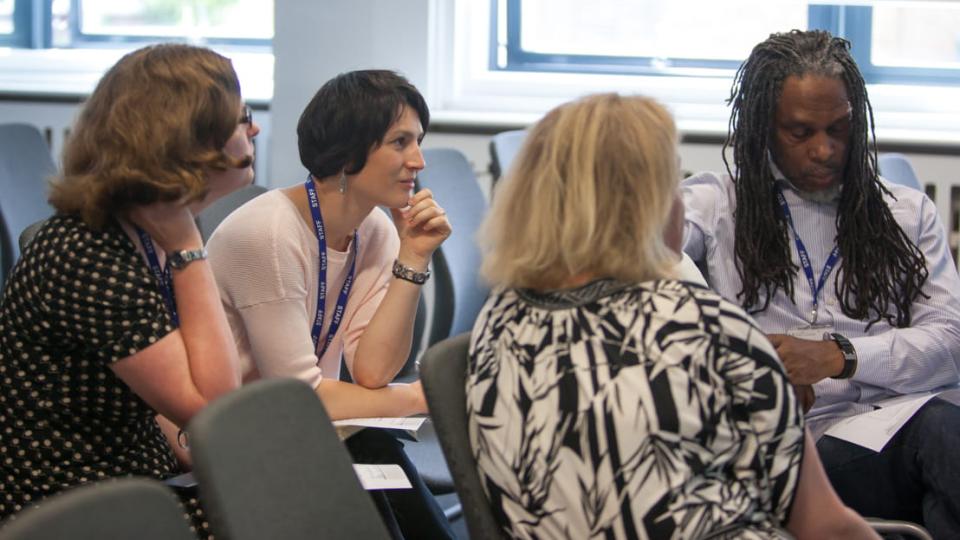- Postgraduate
Professional Academic Practice PgCert
Overview
Are you teaching in higher education? Would you like to enhance your practice by exploring the latest developments in academic learning and teaching?
Whether you are new to teaching in higher education in the UK or are an established teaching professional, our inspiring online course is designed to help you develop your teaching skills, techniques and methodologies.
This course is suitable for those teaching/supporting learning in universities, on courses validated by a university or for practice educators in the NHS.
To take this postgraduate certificate in higher education you will need to be involved in a minimum of 60 hours of teaching and/or supporting student learning during the year.
This is so you can reflect on your academic practice and actively engage in enhancing your teaching/support for leaning as you study.

Select your desired study option, then pick a start date to see relevant course information:
Start date:
If your desired start date is not available, try selecting a different study option.
Why study Professional Academic Practice with us?


What our students say…
UWL has a great community feel and I love my course. It's the place to be.




Course detail & modules
This online course has been carefully designed to balance the time you spend in independent online guided study, taking part in activities (alone and in a group) and producing work. Each week there is an online 90-minute webinar on Friday from 12.45–14.15 which you need to attend.
As the course focuses on academic practice, you will be taught using a wide range of teaching tools and methods including online lectures, presentations, group work, discussions, video, simulation and social media. You will use tools including Blackboard, Collaborate, AI and Poll Everywhere.
Throughout the course, we aim to:
- support you in becoming a reflective practitioner whose teaching is inclusive and underpinned by scholarship
- provide a safe learning environment where you can critique current issues and agendas within higher education
- develop your academic practice and support your ongoing professional development plan including the use of emerging technologies.
While studying for your postgraduate certificate in professional academic practice you will be expected to effectively manage your time so you are able to contribute to fully, and benefit from, the coursework. To help you plan, we will give you an estimate of how long learning activities and study will take each week. This will help you to develop your strengths in self-direction and initiative.
At the start of your course, you will meet your personal tutor in an individual meeting via Teams and have an online induction. This not only introduces you to the course requirements but also provides an opportunity for you to develop your online learning skills.
Over the course of the PgCert, you will develop a portfolio and submit it through the UWL virtual learning environment called Blackboard. This may include:
- a reflection on observations of your teaching/support for learning by peers and mentors
- a reflective account of your own practice as an educator underpinned and aligned with the United Kingdom Professional Standards Framework 2023 of the HEA
You will be in contact with your course leader throughout your studies and your personal tutor will support your online learning activities and give you feedback on assessments as you develop your portfolio. You will also need to have a mentor at work who will be your first point of contact for the workplace activities on the course. They will also offer guidance on developing your subject-specific skills and on your career development.
Upon successful completion of the programme, you will have demonstrated or will be able to demonstrate:
- critically evaluate current practice, issues and new insights, at the forefront of professional academic practice in HE teaching and support for learning including digital tools and AI.
- critically examine curriculum design approaches and assessment strategies focusing on developing an inclusive and equitable practice to enhance learner engagement
- evaluate current research and scholarship in higher education and apply an evidence-based approach to your practice informed by relevant and current literature
- reflect and critically evaluate your practice, exploring how this is informed and influenced by quality assurance, enhancement and policy
- reflect on your practice, learn independently and engage in continuing professional development
- explore collaborative approaches to enhance practice and reflect critically on your experiences of collaboration in your context.
Compulsory modules
• HE Context and Implications for Practice
• Learning Theories and our students
• Teaching and Learning Methods
• Curriculum Design
• Assessment and Feedback
• The Academic Educator
• Quality and Regulations
Equality, Diversity and Inclusivity (EDI)I, Digital Technology and AI, ESD and Evidence-Based Practice are additional topics that are addressed in all the major themes.
The Learning Outcomes for the course are adapted from those of the Framework for Higher Education Qualifications (FHEQ) at Level 7.
Entry requirements
You should have one of the following:
- an honours degree from a UK university or the Republic of Ireland
- an honours degree from an approved institution of higher education outside the UK and Republic of Ireland; please visit the country pages for more information
- a recognised equivalent professional qualification and/or professional experience.
You will need to provide evidence that you will be engaging in at least 60 hours of teaching and/or supporting student learning throughout the academic year. You will be invited to a brief conversation via Teams to discuss your current role and responsibilities with regards to the course by the Head of CELT, Dr Jessica Frye.
We look for students who show enthusiasm and a passion for the subject through previous study or professional experience.
If you have any questions about the relevance of your qualifications, experience or the course in general, please contact the course leader Kate Hellman (kate.hellman@uwl.ac.uk) or the Head of CELT Dr Jessica Frye (Jessica.frye@uwl.ac.uk).
Fees & funding
Please note:
- Fees for the 2026/27 academic year and onwards may be subject to Government regulation and change.
- Tuition fees are charged for each year of your course. If your course runs for two years or more, you will need to pay the fee for each academic year at the start of that year.
- If your course runs for less than two years, the cost above is for your full course and you will need to pay the full fee upfront.
- If no fee is shown above then the fees for this course are not available yet. Please check again later for updates.
Funding your studies
A range of loans, bursaries and scholarships are available to help you fund your studies.
If you are studying a Masters course you may be eligible to apply for a Postgraduate Loan, this may help contribute towards your course fees and living costs.
Additional funding is available to some types of students, such as disabled students.
Within the university, we offer a range of scholarships and bursaries. View full details including conditions and eligibility.
Please note:
- Fees for the 2026/27 academic year and onwards may be subject to Government regulation and change.
- Tuition fees are charged for each year of your course. If your course runs for two years or more, you will need to pay the fee for each academic year at the start of that year.
- If your course runs for less than two years, the cost above is for your full course and you will need to pay the full fee upfront.
- If no fee is shown above then the fees for this course are not available yet. Please check again later for updates.
International students - funding your studies
We offer scholarships for international students including International Ambassador Scholarships.
Further information about funding and financial support for international students is available from the UK Council for International Student Affairs.
Study & career progression

This course can help you develop your practice as an educator in your current role or help prepare you for your next career move or promotion.
Participants may be UWL staff or staff from other institutions, but as a postgraduate student, you will have access to life-long advice and support from the UWL Careers Team.
Whilst studying you may have discovered an area you want to study in more depth. Doctorate study enables you to specialise and develop your research and analysis skills.
See our range of postgraduate courses for further details.
How to apply

You can apply online at any time by following the link below.
Our application form will ask you for some information about:
- what you want to study
- your previous qualifications or experience
- your references
- how we can contact you.
Want to ask us a question first? We would love to hear from you. Contact us free on:
- 0800 036 8888
- courses@uwl.ac.uk
Apply for this course
Next steps after making your application
We aim to make a decision on your application as quickly as we can. If we need any more information about your qualifications, we will be in touch.
In the meantime, come and visit us and find out more about what studying at UWL is like. Sign up for an open day or join a campus tour.
Visit us and see for yourself
Talk to our tutors and find out about our courses and facilities at our next open day or join a campus tour.
We're here to help
Any questions about a course or studying at UWL? We're here to help - call us on 0800 036 8888 (option 2, Monday – Friday 10am-4pm) or email us on courses@uwl.ac.uk.
Our postgraduate prospectus
All of our courses in one place - download now or order a hard copy.

You can apply online at any time by following the link below.
Our application form will ask you for some information about:
- what you want to study
- your previous qualifications or experience
- your references
- your visa (if required)
- how we can contact you.
Want to ask us a question first? Our dedicated international students’ team would love to hear from you.
- email international@uwl.ac.uk to submit a question
Apply for this course
Next steps after making your application
We aim to make a decision on your application as quickly as we can. If we need any more information about your qualifications, we will be in touch.
In the meantime, come and visit us and find out more about what studying at UWL is like. Sign up for an open day or join a campus tour.
Visit us and see for yourself
Talk to our tutors and find out about our courses and facilities at our next open day or join a campus tour.
We're here to help
Any questions about a course or studying at UWL? We're here to help - call us on 0800 036 8888 (option 2, Monday – Friday 10am-4pm) or email us on courses@uwl.ac.uk.
Our postgraduate prospectus
All of our courses in one place - download now or order a hard copy.
Related courses
Search for courses
Student life at UWL
Important notes for applicants
Disclaimer
*Modern universities - defined as higher education institutions that were granted university status in, and subsequent to, 1992.
**The National Student Survey 2023 and 2024 - Average of answers to all questions by registered student population. Excludes specialist institutions.
Testimonials - our students or former students provided all of our testimonials - often a student from the course but sometimes another student. For example, the testimonial often comes from another UWL student when the course is new.
Optional modules - where optional modules are offered they will run subject to staff availability and viable student numbers opting to take the module.
Videos - all videos on our course pages were accurate at the time of filming. In some cases a new Course Leader has joined the University since the video was filmed.
Availability of placements - if you choose a course with placement/internship route we would like to advise you that if a placement/internship opportunity does not arise when you are expected to undertake the placement then the University will automatically transfer you to the non-internship route, this is to ensure you are still successful in being awarded a degree.

